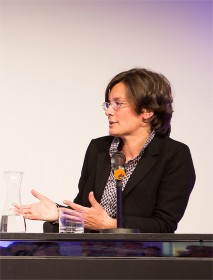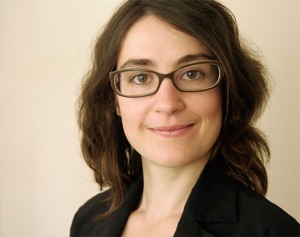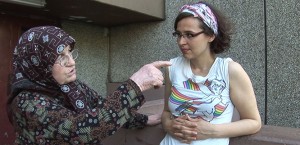
Dr. Karen Körber, the first scholar ever to benefit from the Fellowship Program of the Jewish Museum Berlin © JMB, Photo: Ernst Fesseler
The Jewish community in Germany has undergone a profound change in recent years—and the protagonists behind that change are the primary focus of research undertaken by Dr. Karen Körber, the first scholar of the Fellowship Program of the Jewish Museum Berlin. For the last two years Dr. Körber has been investigating “Daily Realities: Jewish Life in Germany Today” and she recently spoke to me about her findings.
Karen, the Fellowship Program of the JMB supports research into Jewish history and culture as well as into broader-ranging aspects of migration and diversity in Germany. You are the first person ever to complete the two-year Fellowship Program—a pioneer, so to speak—and I’d be interested to hear about that experience.
I found myself in a very open situation and was able to do much as I liked. All fellowship programs are fundamentally privileged set-ups but this particular one has the advantage of being attached to a well-endowed institution of international renown. → continue reading
Tomorrow evening, 9 September 2014, the cultural anthropologist Alina Gromova will present her book “Generation ‘kosher light’” (transcript Verlag 2013) in the Academy of the Jewish Museum Berlin. As in the case of the many other authors whose “New German Stories” we recently discussed, we put three questions to Ms. Gromova prior to her reading:

Alina Gromova © Judith Metze
Alina, for your study of an international group of young Jews in Berlin you took the city itself as your springboard. Exploring the locations where your subjects live, hang out, mingle and party enabled you to chart their diverse notions of identity, tradition and religion. Why did you opt for such an explicitly spatial focus?
Identity and tradition are terms often difficult to grasp, because they are interwoven with symbols, values, wishful thinking or memories. A space, however, has not only a symbolic but also a physical dimension and is therefore more palpable. Personally, I don’t see a space as a 3-D void waiting to be filled by people or things. On the contrary, people and things are what create a space in the first place. And urban space is especially fascinating, I find, because a broad cultural and religious spectrum often occupies one and the same spot, however tiny; and different elements simultaneously give rise there to their own spaces, so the result is a palimpsest of spaces that then interconnect.
→ continue reading

Canan Turan with her grandmother
© Adriana Uribe
In our series of events “New German Stories” we present different perspectives on the immigration country Germany. That immigrants from Turkey, Vietnam, Poland, India and Cameroon and their descendants have stories to tell is nothing new—the novel twist is, that they present them here as German stories. On Tuesday, 8 July, director Canan Turan will be a guest of the Academy of the Jewish Museum. In her film KIYMET, she tells the story of her grandmother, who migrated to Berlin from Turkey in the early 70s. We asked Canan three questions about her project:
How did the idea to make a film about your grandmother Kıymet come about? → continue reading


